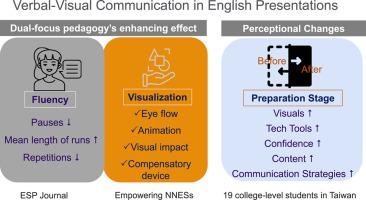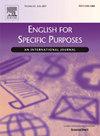Verbal-visual skill-building and perceptional changes in English presentation
IF 2.7
1区 文学
Q1 LINGUISTICS
引用次数: 0
Abstract
Oral presentations in English are emphasized in higher education, yet verbal and visual communication often lack balance in academic training. Mastery of visual aids is as crucial as verbal expression, especially for nonnative English speakers. This research proposed a skill-building pedagogy to optimize dual-channel communication, involving 19 college students from a Southern Taiwanese University. A progressive instructional design incorporated English for Specific Academic Purposes, visual communication, and tech-tool applications. Verbal fluency and visual use were assessed to evaluate learning outcomes; perceptional changes were revealed. Data collection included presentation footage, surveys, and interviews. Results showed significant improvements in verbal fluency and visual mastery after multimodal reinforcement. Students' awareness and confidence grew with skill development, significantly changing their preparation stage perceptions. Presentation language, visualization skills, and technological tools empowered nonnative English speakers to overcome linguistic constraints through practice and feedback. This research highlighted the need for comprehensive training programs that empirically demonstrate how verbal and visual resources enhance each other during presentations. The findings validated that deliberate learning and conscious preparation in oral speech and visual techniques optimize communication. Enhancing English learners' multimodal expression skills prepares them for academic and professional success.

英语演讲中的语言-视觉技能培养和感知变化
高等教育强调英语口头报告,但在学术培训中,口头和视觉交流往往缺乏平衡。掌握视觉辅助工具与口头表达同样重要,尤其是对英语非母语者而言。本研究提出了一种技能培养教学法,以优化双通道交流,来自台湾南部一所大学的 19 名大学生参与了这项研究。渐进式教学设计融合了学术英语、视觉交流和技术工具应用。通过评估语言流畅性和视觉使用情况来评价学习成果,并揭示了感知方面的变化。数据收集包括演示录像、调查和访谈。结果表明,经过多模态强化后,学生的语言流畅性和视觉掌握能力有了明显提高。随着技能的发展,学生的意识和自信心也在不断增强,他们对准备阶段的看法也发生了显著变化。演示语言、可视化技能和技术工具增强了非英语母语者通过练习和反馈克服语言限制的能力。这项研究强调了综合培训计划的必要性,这些计划可以通过经验证明语言和视觉资源如何在演讲过程中相互促进。研究结果证明,有意识地学习和准备口语和视觉技巧可以优化交流。提高英语学习者的多模态表达能力可以帮助他们在学术和职业上取得成功。
本文章由计算机程序翻译,如有差异,请以英文原文为准。
求助全文
约1分钟内获得全文
求助全文
来源期刊

English for Specific Purposes
LINGUISTICS-
CiteScore
5.70
自引率
8.00%
发文量
41
审稿时长
62 days
期刊介绍:
English For Specific Purposes is an international peer-reviewed journal that welcomes submissions from across the world. Authors are encouraged to submit articles and research/discussion notes on topics relevant to the teaching and learning of discourse for specific communities: academic, occupational, or otherwise specialized. Topics such as the following may be treated from the perspective of English for specific purposes: second language acquisition in specialized contexts, needs assessment, curriculum development and evaluation, materials preparation, discourse analysis, descriptions of specialized varieties of English.
 求助内容:
求助内容: 应助结果提醒方式:
应助结果提醒方式:


